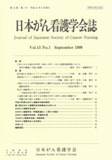Japanese
English
- 販売していません
- Abstract 文献概要
- 参考文献 Reference
要旨
退院後の大腸ストーマ造設患者(61名)を対象に,セルフケアの状況,退院後に受けた医療・社会的支援の経験とニーズの側面から,退院後に必要な具体的支援内容を検討した.データ収集は質問紙と診療録より行い,50名より有効回答を得た.セルフケアの状況については,ストーマとその周囲の変化の観察を実施しているという回答が少なかった.さらに,ストーマとその周囲の観察の実施は,医療従事者からそれに関する支援を受けた経験と関連していた.また,退院後に受けた支援とニーズについては,日常生活や退院後長期にわたるケアに関する支援内容において,回答割合に大きな差がみられた.また,退院後の支援内容により,患者が望む支援者の対象に違いがみられた.以上の結果から,退院後,ストーマとその周囲の変化の観察に関する内容,日常生活や退院後長期にわたるケアに関する内容とともに,より具体的な内容の支援の必要性が示唆された.
Abstract
The purpose of this study was to clarify the essential support for ostomates living in their home after discharge by asking self-care ability, the evaluation on the care actually received and the care actually demanded. Subjects were consisted of 61 ostomates with 50 effective responses. The data were collected by the questionnaire included three domains in terms of the stoma care and the medical records.
In self-care ability, the responese rate was lower in a observational skill for stoma sites than in other skills of self-care. The observational skill was more accurately used by ostomates who had learnt it from health care professionals than those who had not it. It was shown that the response rate on the care actually received differed from that on the care demand after discharge, especially, in the area of activities to meet basic needs and care needs associated with physiological changes. It was also identified that ostomates tended to choose health related persons by themselves based on their needs for help. The research findings may suggest that skills and knowledge to evaluate a progress of stoma sites, to meet basic needs and the long-term care needs and specific care to solve the stoma related problems are needs to be supported ostomates in home.
Copyright © 1999, Japanese Society of Cancer Nursing All rights reserved.


